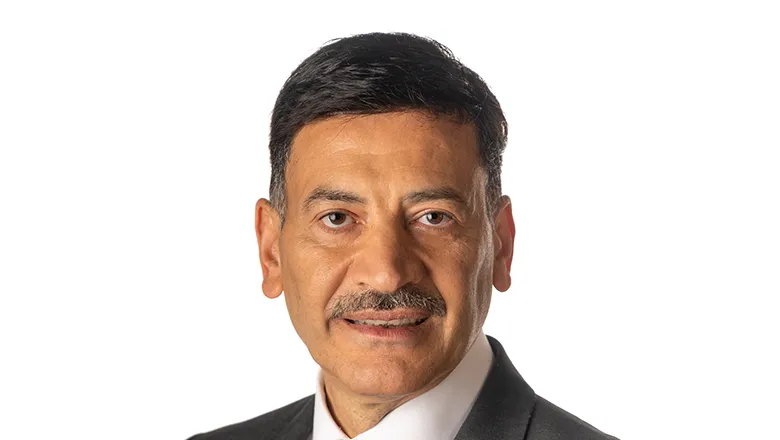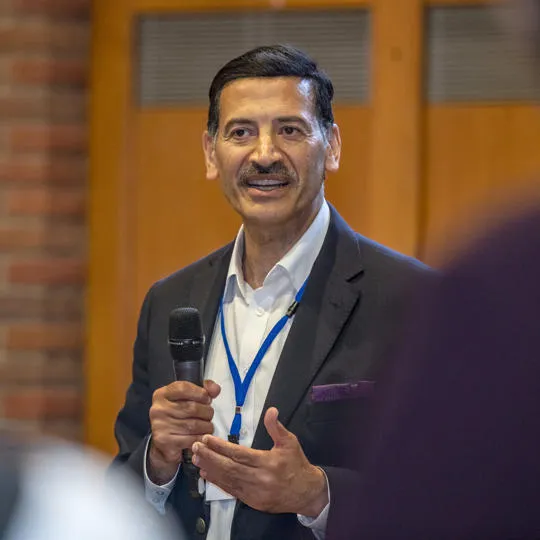It’s a fantastic achievement personally for one of our academics to become a Royal Society Fellow, but also one for King’s as a wider institution of excellence and learning. My congratulations to Bashir for being recognised as a world-class talent and leader in his field; he now joins so many others across the university”
President & Principal of King’s College London, Professor Shitij Kapur
10 May 2023
King's Vice President for Research & Innovation, Professor Bashir M. Al-Hashimi, elected Fellow of the Royal Society
Professor Al-Hashimi was nominated for his pioneering work on semiconductor chips and energy-efficient computation.

Professor Bashir M. Al-Hashimi CBE, Vice President (Research & Innovation) at King’s, and former Executive Dean of the Faculty of Natural, Mathematical and Engineering Sciences, has been elected as a Fellow of the Royal Society.
Professor Al-Hashimi was elected to the Royal Society by a host of peers for his contribution to the engineering sciences, having previously received a CBE for his services to engineering research and industry. His work includes groundbreaking research as an ARM Professor of Computer Engineering on semiconductor chips and energy efficient computation, including work in the relatively new field of energy harvesting computing.
His research has led to substantive innovations in related enabling technologies and advanced applications. The impact of his research and technology transfer has been significant in academia and industry.
Professor Al-Hashimi said, “I am thrilled to have been elected as a Fellow of the Royal Society and humbled to join not only many Nobel laureates amongst its current fellows and foreign members but also a network of outstanding scientists and engineers worldwide, who have contributed profoundly to the advancement of scientific and technical excellence to benefit both society and humanity”.
Established in 1660 and responsible for the publication of Isaac Newton’s Principia Mathematica, the Royal Society is the oldest academy in continuous existence and home to 1,600 of some of the world’s most eminent and boundary-pushing scientists.
The Society has played a part in some of the most fundamental discoveries in scientific history, including the first sighting of micro-organisms and the discovery of Uranus. Fellows continue to make outstanding contributions in areas as diverse as engineering and neuroscience.
Professor Al-Hashimi’s election as a new Fellow brings the total number of current King’s academics in the Royal Society to twelve.
Sir Adrian Smith, President of the Royal Society said: “I am delighted to welcome our newest cohort of Fellows.
“These individuals have pushed forward the boundaries of their respective fields and had a beneficial influence on the world beyond.
“Among this year’s intake are individuals who were at the forefront of the response to the COVID-19 pandemic response, and those working on global challenges, from TB to climate change. They are pioneering scientists and innovators from around the world who have confounded expectations and transformed our thinking.
“This year’s intake have already achieved incredible things, and I have no doubt that they will continue to do so. I look forward to meeting them and following their contributions in future.”
Over the course of his career, Bashir has made a series of theoretical and practical contributions to the testing, design and deployment of semiconductor microchips and energy-efficient computation in embedded and mobile digital devices.
This election to the Fellowship of the Royal Society comes soon after Bashir’s election to the fellowship of the European Academy of Science and Arts in April 2023. The Academy is a non-governmental, Europe-wide association bringing together 2,000 scientists, artists and interdisciplinary practitioners to promote scientific and societal progress. Bashir has also been a Fellow of the Royal Academy of Engineering since 2013, and was awarded the prestigious IET Faraday Medal in 2020 for his contributions to semiconductor chip manufacture.

